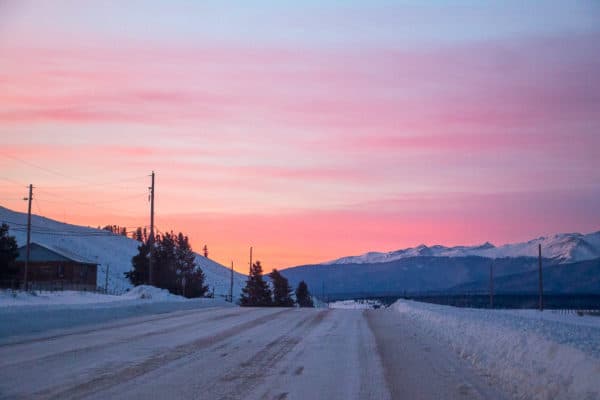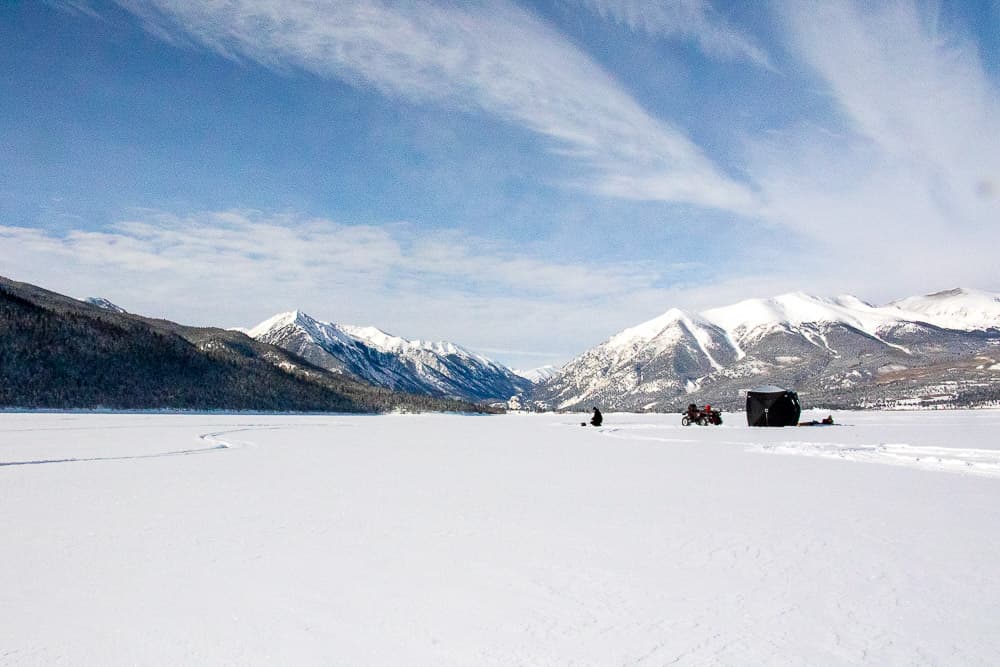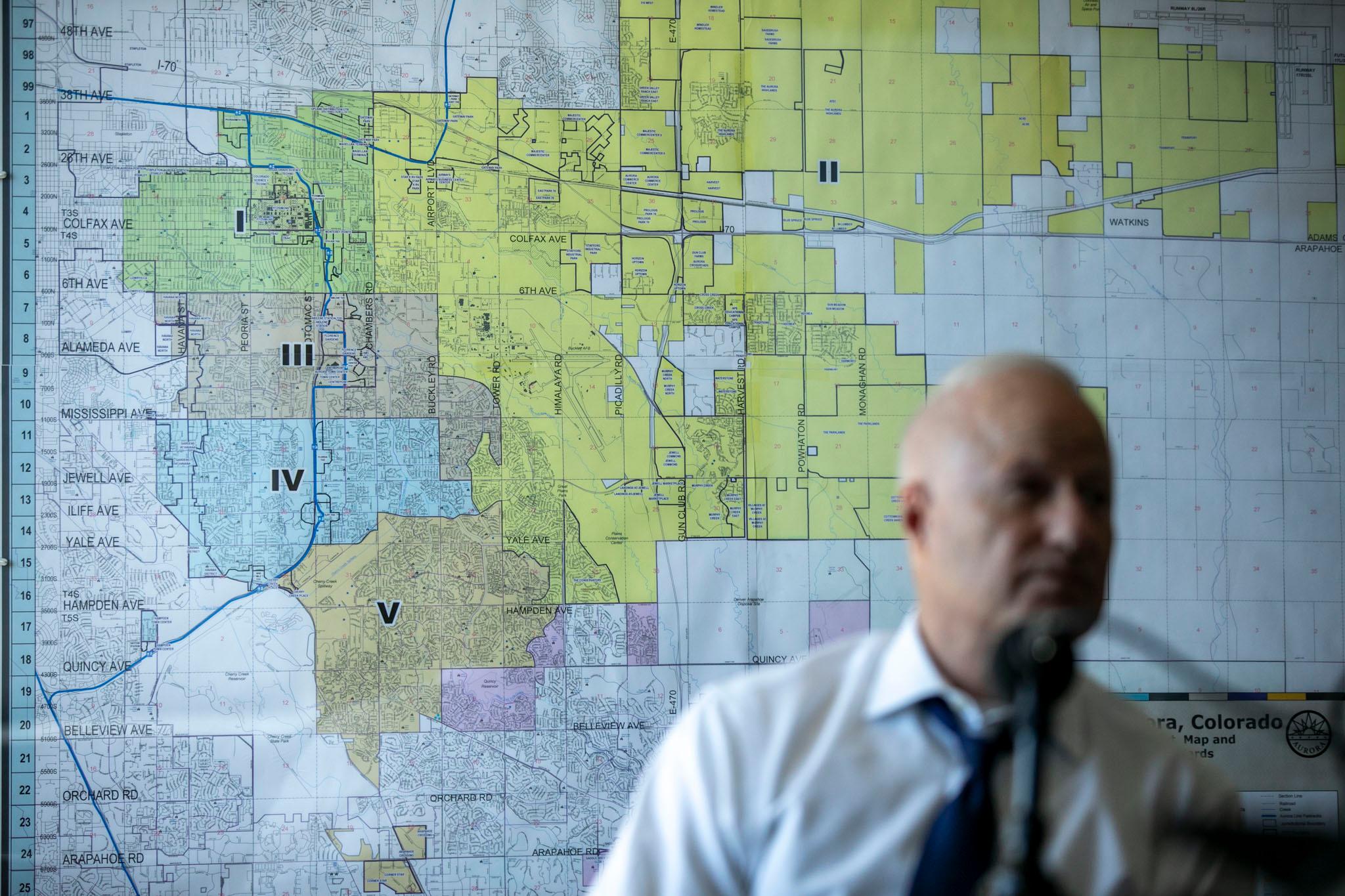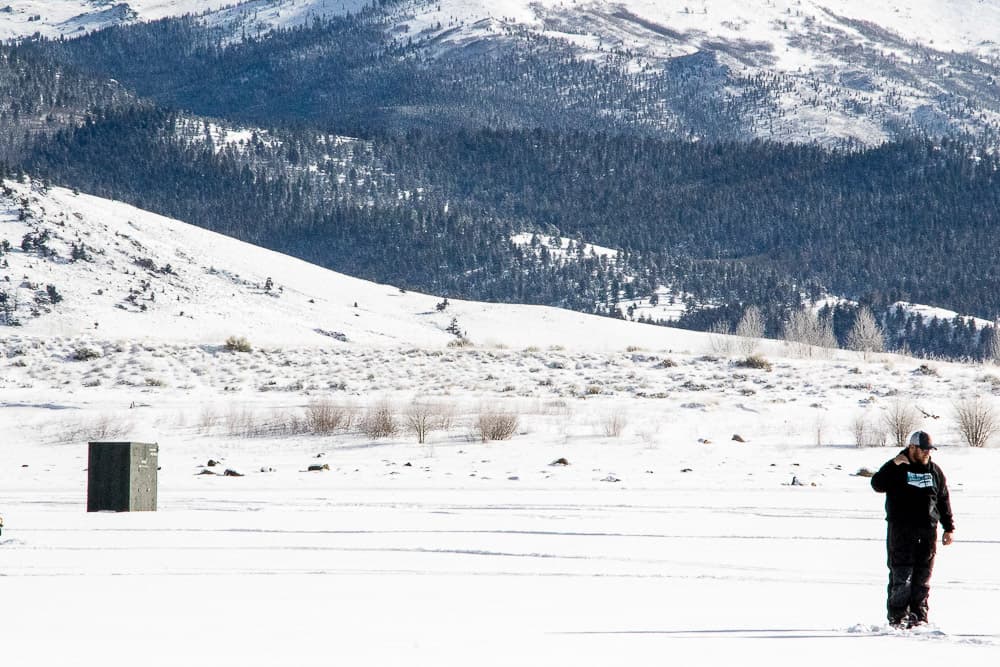
The thermostat on Shane DuBois’ Ford F-150 reads -31 degrees when he steps out of it to begin the the quarter-mile hike to the patch of ice he wants to claim for the day at Twin Lakes Reservoir.
It’s a little after 6 a.m. Saturday. DuBois loads up his sled with his poles, tackle, tent, propane space heater, cooler an auger and more. It weighs close to 200 pounds when everything is finally arranged. DuBois’ beard tends to get frosty on days this frigid.
“It makes me look like Mr. Freeze,” he says.
Ice fishing season started late this year, but DuBois has already been out 25 times.
Today, DuBois is after lake trout or what he calls “lakers.” It takes him 30 minutes to get to his preferred patch of ice with all that gear in tow. He fires up his auger, which resembles a jackhammer with a corkscrew bit attached to the bottom, and starts drilling.
Although it’s difficult to quantify, ice fishing is on the rise in Colorado. The Colorado Parks and Wildlife Department can’t put a number on it because it doesn’t keep tabs on ice fishing specifically, but the most avid ice fishermen say they’ve seen frozen-over lakes get more and more traffic in recent years.
"We’ve definitely seen it in the least three of four years, especially on the metro lakes," DuBois says. "It looks like little cities out there, whereas five years ago, there’d be a handful of people on the lake."
Generally, the more avid ice fishers like to head to the mountains, where there's less traffic on lakes, thicker ice and an abundance of trophy fish. Casual ice fishers stick to lakes and reservoirs in the high plains, where the fish are more common species like perch, blue gill, crappie, walleye and bass. Cherry Creek Reservoir is a popular local spot when weather permits.
DuBois, 30, has ice fished almost everywhere in Colorado since he moved to the state in 2009. He goes anywhere between 60 and 90 days per year, basically anytime he’s not working as an insurance property adjuster at American Family Insurance.
The Twin Lakes reservoirs, tucked away in the Rockies near Leadville, are among DuBois’ favorite places to ice fish. The lake trout here put up a tremendous fight and can get up to 4 feet long and weigh 50 pounds.
The elements aren’t so bad once DuBois’ tent is set up. He’s drilled two holes inside. The propane space heater sits between them. The ice was 9 inches thick this morning, more than double the last time DuBois came out here, thanks to the sub-zero temperatures.
He flicks his fishing rod up and and down, always with the tip pointed toward the water. That way he can set the hook when a laker does bite.
“Sometimes I think some of these fish are magicians,” he explains. “I have no idea how you can swallow something like that, and I set the hook and they get away. It’s there briefly, and it’s gone as quick as it came”
Over in the corner, DuBois’ depth finder lets him know when a fish might be near. A green dash will appear on the screen, and if it’s a big one, the green dash has a streak of red inside.
“The big ones are definitely magicians,” DuBois says. “They’ve been around. They’ve seen a lot of stuff.”
Last weekend, DuBois hooked a 37-incher. So far this morning, a couple average-sized lakers have bitten.
The jig DuBois is using today glows underwater. He attaches a piece of bait fish called a sucker on the hook next to it. To the fish, it looks like an illuminated meal.
“With the electronics it’s great because you know when the fish are down there. But it’s frustrating because you know the fish are down there and they’re not biting. It’s kind of a love-hate relationship.”
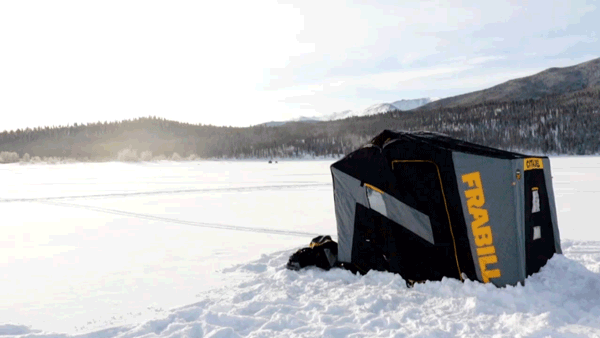
DuBois was 6 years old when he first went ice fishing. He fell in the hole up to his waist the first time his grandfather took him to their small wooden hut on the frozen water in Little Sturgeon, Wisconsin. DuBois had to take his clothes off to let the fuel oil stove inside the hut dry them out.
Despite the rocky start, DuBois grew to love the sport.
DuBois first ice fished in Colorado in 2009. He was in the Army at the time, finishing up an eight-year commitment at Fort Carson. DuBois likes fresh water fishing during warmer months, but he says ice fishing is his favorite.
“I think it levels the playing field,” he says. “You can pretty much have next to nothing and go out to the spots where guys have everything and catch the same fish. Right now, this area we’re at wouldn’t be accessible unless you had a boat. Ice fishing really levels the playing field out a little bit. And for me, it’s enjoyable because you’re sitting over a natural aquarium. A lot of times you’ll see fish coming right under the hole.”
Brian Alano, the owner of the tackle company Dynamic Lures, which DuBois helps out with as a member of the marketing staff, agrees.
"You’re able to get out there without a boat, without a motor and target these big fish without spending a lot of money. And you really know where they are in the winter," Alano says. "We can sit in one spot, and they’re going to come by and we’re going to get a chance to catch a trophy-sized fish."
A little after 8:30 a.m., a laker appears under the hole. DuBois’ jig is visible from the surface when the fish zooms up and bites. DuBois jerks the rod up and reels. The hook is set. DuBois easily reels it up to surface, grabs it out of the water and removes the hook.
“That fish literally hit 2 feet under the ice,” he says. “It’s 18 or 19 inches. That’s a little guy.”
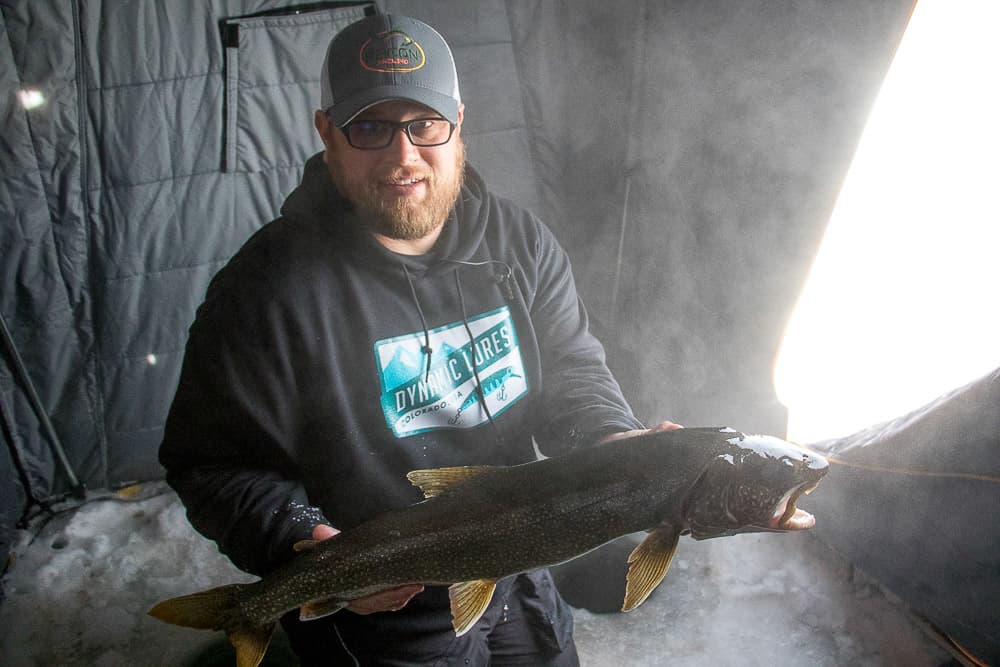
Lake trout notoriously take a long time to develop. A 30- to 40-inch fish can be between anywhere from 15 to 60 years old. DuBois stresses the importance of handling those fish with care. Fighting them for too long can kill them. And once you do catch them, DuBois says, it’s important to dunk their heads below the water while holding onto the fish’s tail, which allows it to catch its breath, before releasing it.
DuBois is also adamant about catching and releasing, particularly when it comes to some of the trophy lake trout found in Twin Lakes.
“A fish that size, that old — you have to have a natural respect for it,” he says. “A fish that old, like with anything, you don’t wanna eat anything that old or that big. Plus if you take a fish like that out, you’re taking a big resource out of the lake.”
DuBois is a new-age fishermen of sorts. He’s not shy about sharing photos and videos of his fishing adventures on social media. Almost all of his Facebook profile pictures depict him holding trophy-sized fish, save for one of him handling a gun from his stint in the Army and one from Nov. 8 that reads “I Voted Ice Fishing.”
He’s even had a hand in starting two online fishing media sites. His latest project is called Recon Angling. He founded it two months ago. The idea is to give Colorado anglers a forum to talk, provide information about conditions, locations and safety tips, and produce instructional videos.
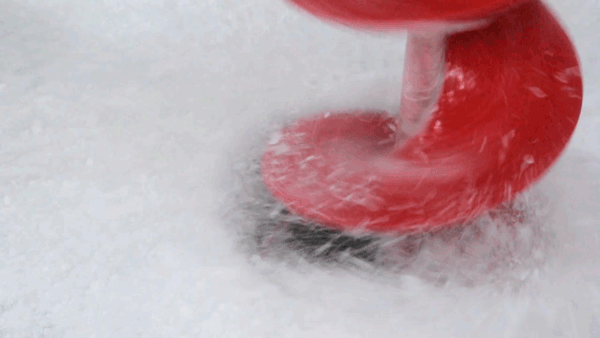
As more and more people flood into Colorado, DuBois wants to educate them about things like how to tell if the ice is too thin, or which fish anglers should release and which are OK keeping.
Not everyone appreciates DuBois sharing ice fishing secrets with anyone who has an internet connection, though. Last weekend, a long-time lake guide told DuBois he shouldn’t show people where he was fishing.
"There are people who are real hush-hush about it," Alano says. "They hide the background of where they are or what they’re using. But they’ll show you the fish they caught. There’s two sides to it, of course. I can respect those that want to keep it hush-hush. But I have respect for people who are unafraid to teach people what they’re doing.”
It’s a slow day, but that hasn’t stopped DuBois from landing half a dozen lakers. Other groups on the lake each report they’ve only landed one or two.
DuBois has ice fished in Colorado for more hours than he can count. Success in the sport depends on a lot more than you might think if you want to catch the best fish, he says. You have to understand a lake’s structure and a fish’s biology and tendencies.
“There’s just a lot that goes with it,” he says. “It can get pretty intense.”
